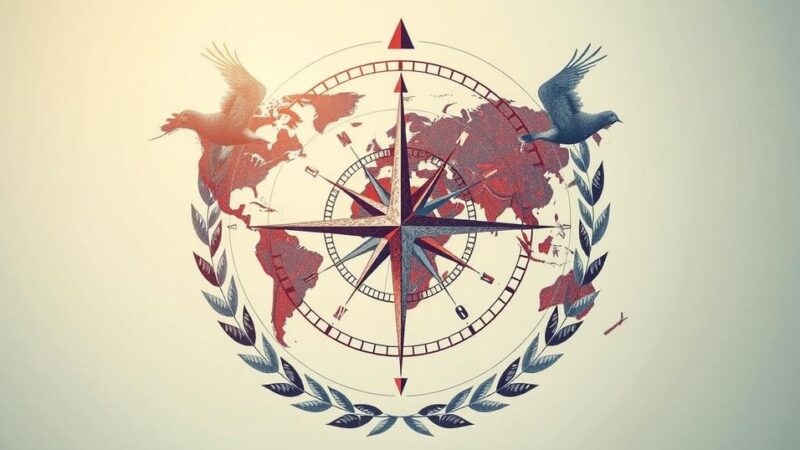Former President Trump has indicated a desire for China to assist in mediating peace in the Ukraine conflict, referencing Xi Jinping’s potential influence over Russia. Despite tariffs complicating relations, analysts suggest mutual interests might lead to cooperation. As the upcoming Munich Security Conference looms, the intricacies of negotiations involve balancing U.S. commitments, Ukrainian sovereignty, and China’s relationship with Russia.
As the Ukraine conflict approaches its fourth year, former U.S. President Donald Trump has voiced optimism regarding China’s involvement in mediating peace. During a recent gathering at the World Economic Forum in Davos, Switzerland, Trump stated, “Hopefully, China can help us stop the war… they have a great deal of power over that situation, and we’ll work with them.” This perspective underscores Trump’s inclination to leverage resources and influence from the Chinese leadership, particularly Xi Jinping.
Despite this hopeful outlook, Trump’s recent imposition of tariffs on Chinese imports could complicate any collaborative effort with Beijing. Analysts believe that continued U.S.-China tension could motivate China to engage more actively in the Ukraine crisis, especially if they perceive Trump’s overtures as a pathway to improving bilateral relations. Yun Sun of the Stimson Center notes, “…if Trump prices China’s cooperation as the one critical issue that could improve US-China relations, I think China will be very tempted.” However, caution looms, as China is likely wary of jeopardizing its alignment with Russia.
China has sought to present itself as a peace broker in the Ukraine conflict but faces skepticism from the West due to its support for Russia. The balance of relationships remains delicate, as China must weigh the potential fallout from distancing itself from Moscow. Chong Ja Ian, a professor at the National University of Singapore, warns, “The real outcome that Beijing would like to avoid is a very much weakened Russia,” which would compromise one of China’s key partnerships.
The upcoming Munich Security Conference will serve as a critical platform, where discussions about the conflict will unfold with U.S. Vice President JD Vance meeting Ukrainian President Volodymyr Zelensky. This forum will also witness the participation of Chinese Foreign Minister Wang Yi. In recent statements, Trump has suggested a more transactional approach towards Ukraine, proposing that U.S. access to Ukraine’s natural resources be exchanged for military support. This shift highlights the evolving discourse around U.S. commitments to Ukraine amid the ongoing war.
Despite Ukraine’s president expressing willingness to negotiate with Russia, such talks hinge on Western assurances of support and guarantees of security. The conditions set forth by Russia, including retracting NATO aspirations and territorial concessions, have increased the complexity of potential agreements. Observers emphasize the need for clarity from Trump’s administration about desired peace terms to facilitate a workable US-China-Russia dialogue.
China’s perceived neutrality belies its role as a significant ally for Russia, supplying essential goods despite international pressure. Liu Dongshu, an expert in Chinese politics, points out that China’s dependence on Russian collaboration serves its interests, stating, “Can China threaten to cut off the supply… It can’t, because China cannot afford a completely failed Russia.” This reality reflects China’s strategic calculations within the broader geopolitical framework.
For Xi Jinping, a close partnership with Russia remains vital, especially amidst tensions over Taiwan. Engaging with Trump to negotiate a peace deal could mark a prominent shift in China’s position regarding the war, aligning more with U.S. interests. Nonetheless, such a collaboration poses risks to Beijing’s broader strategy of countering Western influence and fostering a new global order. Analysts note that both Xi and Trump may seek to leverage any negotiations to bolster their images as peacemakers in a complex international arena.
In conclusion, the potential for a collaborative effort between Trump and Xi in mediating peace in Ukraine raises significant diplomatic questions. Both leaders have motivations tied to their domestic and international standings, which may create openings for dialogue. However, the complexity surrounding Russia’s position, Ukraine’s sovereignty, and U.S.-China relations must be delicately navigated to foster any lasting peace.
In summary, former President Trump’s call for China to assist in resolving the Ukraine conflict emphasizes the intricate dynamics of international diplomacy. While the prospect of collaboration between Trump and Xi holds promise, the nuances of U.S.-China relations and the implications of Russia’s sovereignty complicate the path to peace. The upcoming Munich Security Conference will be pivotal in shaping future negotiations and understanding the strategic interests at play among these global powers.
Original Source: www.cnn.com






